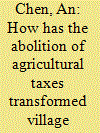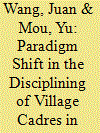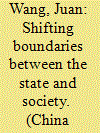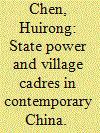|
|
|
Sort Order |
|
|
|
Items / Page
|
|
|
|
|
|
|
| Srl | Item |
| 1 |
ID:
141096


|
|
|
|
|
| Summary/Abstract |
The abolition of agricultural taxes (AAT) (2005–2006) significantly changed the workload, finance, authority and functions of village governments. In agricultural regions, village cadres had their agendas reset, with the top priority switching to the search for new revenues through “attracting investment” (zhaoshang yinzi). This new agenda fits perfectly with the demands of township governments. Facing an even worse fiscal crisis, township governments attempted to cover up their deficits using village revenues. The shared stake in increasing revenue has resulted in the convergence of the functions of township and village authorities. However, the change in the function of village governments has increased the disengagement between cadres and villagers.
|
|
|
|
|
|
|
|
|
|
|
|
|
|
|
|
| 2 |
ID:
181931


|
|
|
|
|
| Summary/Abstract |
Village cadres are important agents for the state yet disciplining them has been difficult. There are few disciplinary tools that can easily hold them to account. Prior to 2018, Party discipline did not apply to non-Party cadres. Legislation was ambiguous in relation to these grassroots agents and had to rely heavily on legal interpretation. The impact of the cadre evaluation system on village cadres, who are not considered to be public servants on the state payroll, was limited. This situation has changed since 2018. The party-state has consolidated and institutionalized ways in which grassroots cadres are checked and disciplined. Instead of relying on policy regulation, which had been the dominant disciplinary method since 1949, village cadres are now fully subject to Party rules and state laws. These changes have been accomplished through the application of three measures. First, village Party secretaries are to serve concurrently as village heads, and members of village and Party committees are to overlap, thereby making them subject to Party discipline. Second, village cadres are now considered to be “public agents” and are on an equal legal footing with other state agents. Finally, a campaign waged by the criminal justice apparatus cleaned up village administration and prepared it for upcoming village elections in a new era.
|
|
|
|
|
|
|
|
|
|
|
|
|
|
|
|
| 3 |
ID:
119183


|
|
|
|
|
| Publication |
2012.
|
| Summary/Abstract |
Despite the central government's efforts in reducing fiscal burdens on peasants through fiscal reforms in the early 2000s, collective petitions in rural China remain. Complementary to the arbitrary and weak government explanations of state-society conflict, this article reveals the role of village cadres as activists in collective petition. Drawn from extensive fieldwork, I argue that by reducing local government revenues and recentralizing fiscal autonomy to the county level, central fiscal reforms have unintentionally induced a new force of resistance: village cadres. Being disenfranchised from previous privileges, village cadres are now allies rather than adversaries of peasant petitions. This article advances existing literature on China's contentious politics in two ways. First, it recognizes a new group of activists whose savoir-faire improves peasant knowledge of the state capacity in containing state-society conflict. Second, it proposes a dynamic understanding of contentious politics by highlighting the shifting boundaries between the state and society.
|
|
|
|
|
|
|
|
|
|
|
|
|
|
|
|
| 4 |
ID:
140476


|
|
|
|
|
| Summary/Abstract |
In the case of land transfer in rural China, why do some village cadres act as entrepreneurs, some become middlemen between agribusinesses and peasants, and others choose to be passive bystanders? Based on comparative case studies in Shandong province, it is argued that state power, rather than village elections, informal solidary groups and economic benefits, is the dominant explanatory mechanism. This article suggests that our discussion of the state–village cadre relationship should not be limited to the control perspective. To achieve policy objectives, village cadres' ability and creativity are as important as motivation to local government. Substantial support makes village cadres more capable, and some degree of leeway is necessary for creativity. Local government relies on three forms of leverage (control, support and non-intervention) to address three issues (motivation, ability and creativity) in shaping behavioral patterns of village cadres.
|
|
|
|
|
|
|
|
|
|
|
|
|
|
|
|
|
|
|
|
|